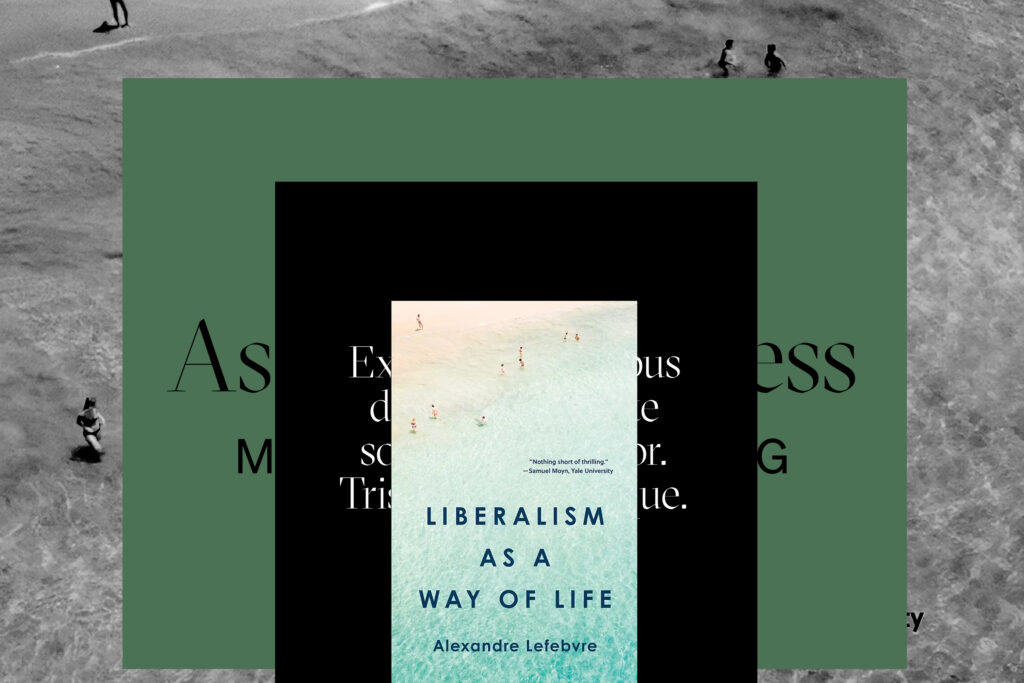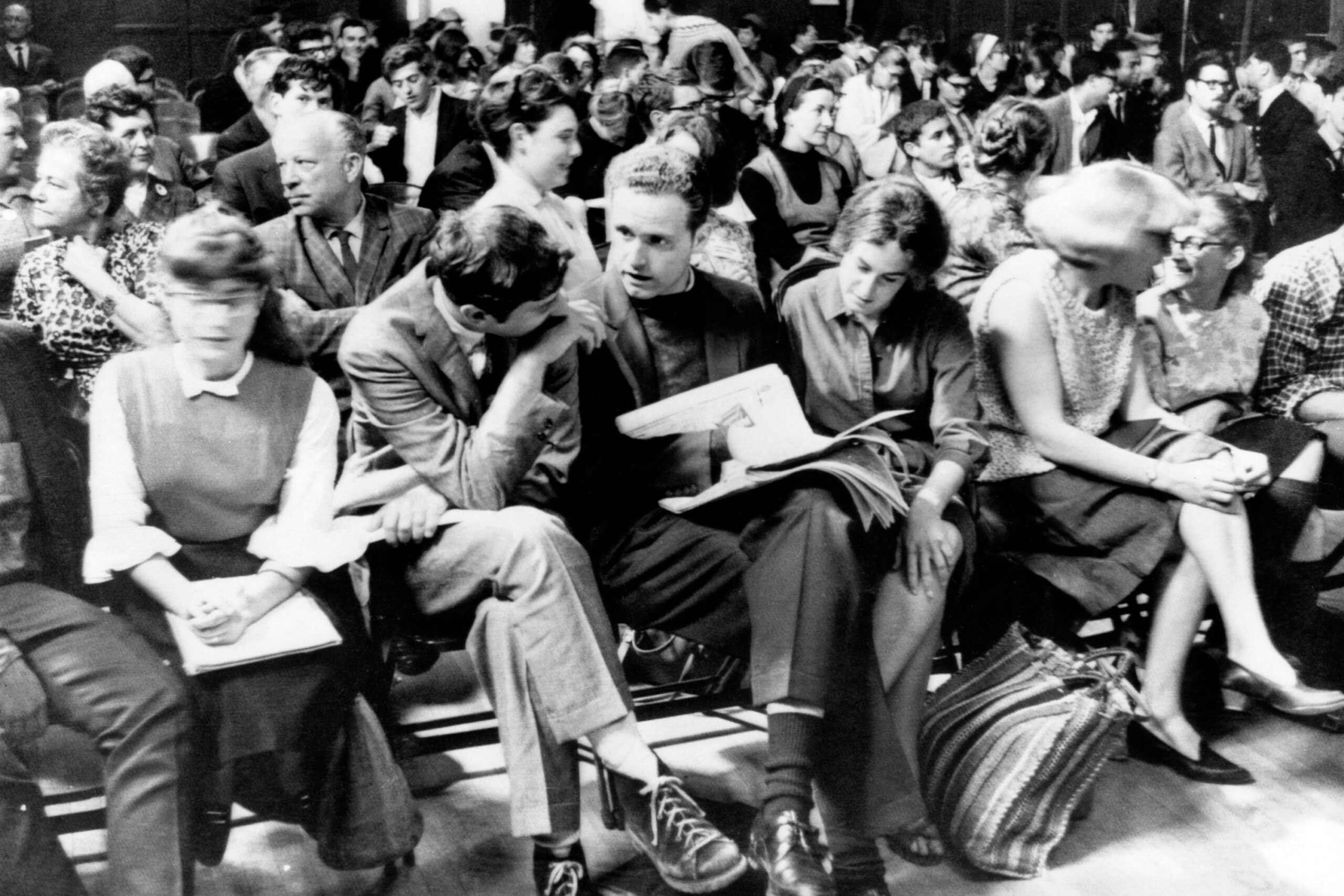Liberalism has been under fire these last years. And John Rawls, liberalism’s personification, has become a bête noire for many. Post-liberalism is winning converts by the minute. Out of this liberal malaise arrives the Australia-based philosopher, Alexandre Lefebvre, who argues, contrary to all, that liberalism is in the air we breathe, the commonsense in which we live. We are all indeed liberals now. The legendary political theorist (of liberalism, anti-liberalism, and so much else) Stephen Holmes has a lot to say about Lefebvre’s optimism.
From liberalism to democracy, Linsey McGoey takes us into the heartland of the U.S., following the travails and spirit of Alexis de Tocqueville, to get purchase on those who haven’t made up their minds about the U.S. election. What she uncovers is both suggestive and surprising.
For our curated content, we lead with an exceptional personal essay from the Brown historian, Omer Bartov, on the dark and disturbing street today in Israel. This is followed by a different kind of darkness, Evgeny Morozov’s slash and burn of neoliberal approaches to AI. From the guy that wrote the book on the perversions of Silicon Valley and its claims for a new form of democratic participation via the intertubes, Morozov calls out a similar wishful thinking as it pertains to AI.
We then feature a tour de force essay from Phenomenal World on Haiti that digs deep into the historical antecedents of today’s colossal crisis. We conclude with a piece from The Dial (subscribe subscribe!) on the traumatic travails of migration as seen through the experimental ingenuity of culture workers.
Our musical selection this week is a chestnut from the late lamented singer songwriter John Prine. His “Angel of Montgomery” is an American classic. Here is the original version from 1971, and as an Ideas Letter bonus, here is Bonnie Raitt’s cover of it from 1974
As Prine writes: “Just give me one thing that I can hold on to. To believe in this livin’ Is just a hard way to go…”
—Leonard Benardo, senior vice president at the Open Society Foundations
Fish Do Not Aspire to Wetness
Misunderstanding Liberalism

Stephen Holmes
The Ideas Letter
Essay
Alexandre Lefebvre’s Liberalism as a Way of Life ambitiously seeks to expand liberalism, as expounded by John Rawls, from a political philosophy into a comprehensive guide for ethical living, a lifestyle method for personal fulfillment. But Holmes questions whether this understanding of liberalism is truly relevant or effective in addressing the pressing challenges faced by contemporary liberal democracies. He also criticizes Lefebvre’s argument as internally contradictory because it simultaneously claims that liberalism is omnipresent and yet that it needs to be actively cultivated.
“Lefebvre’s account of liberalism, including his ingenious interpretation of Rawls, is vividly presented. But his claim that liberalism is ‘a set of ideals, values, attitudes, practices, relationships, and institutions that have become the water, the only water, in which so many of us swim’ is false on his own account. Moreover, the task of showing the relevance to everyday life of basic moral norms of fairness and reciprocity may be easier than he assumes. After all, American political culture today is probably more liberal in the private sphere (acceptance of nontraditional families) than in the public sphere (panic over the Great Replacement, massive tax cuts for the rich). Admittedly, defenders of liberalism from the formidable forces arrayed against it must choose their battles. Making an academic school of ‘political liberalism’ the main enemy to defeat is perfectly welcome and worthwhile. Given a world on fire, however, it is unlikely to be everyone’s first choice.”
Further Reading
Rawls the Redeemer
Alexandre Lefebvre, Aeon
“ … the unchurched in the Western world should point to liberalism as the source of who they are through and through. Liberalism—with its core values of personal freedom, fairness, reciprocity, tolerance and irony—is that society-or-civilisation-sized thing that may well underlie who we are, not just in our political opinions but in all walks of life, from the family to the workplace, from friendship to enmity, from humour to outrage, and everything in between.”
Further Reading
Living Up to Liberal Commitments Means Confronting Capitalism
Matt McManus, Jacobin
Lefebvre’s case “is rather persuasive, but his neglect of the structural conditions that have prevented liberal societies from making good on their promises of liberty, equality, and fraternity means the book’s argument feels incomplete. The left-liberal account of the good life needs to be complemented by a richer understanding of forces of domination that can come from engaging with critical and Marxist traditions of political thought.”
Further Reading
Swimming in Liberalism
Galen Watts, The Point
“A mix of moral and political theory, interpretive social science, self-help and religious exhortation, Liberalism as a Way of Life takes a different tack from other recent defenses of liberalism, which tend to fall into one of three genres: you make the case negatively by playing up the evils of illiberal authoritarianism, you wax lyrical about how good we in the 21st century have it, or you finger-wave your fellow liberals into a state moral contrition. … Assuredly, Lefebvre partakes in a bit of each, but his underlying aims and overarching style differ. Rather than forewarn, lecture or scold, he is looking to edify and elevate. Or put another way: he hopes to help liberals (like me—and most likely you) to not just better know ourselves, but to become, in contemporary parlance, the best version of ourselves. This might sound trite. I assure you it’s not.”
Undecided in America

Linsey McGoey
The Ideas Letter
Essay
McGoey retraces Alexis de Tocqueville’s path in the U.S. in the 1830s to explore the deep political and economic anxieties felt by many Americans in this pivotal election year. She describes the disillusionment of voters who feel unrepresented by both political parties and draws a connection between Tocqueville’s historical reflections about inequality and the continued need for robust government intervention to protect workers. McGoey underscores the persistent tension between industrial despotism and democratic ideals, as voters grapple with economic survival and societal change.
“Today, just like in Tocqueville’s time, wealth in America is unequally distributed. What’s forgotten is that Tocqueville identified the growing chasm between rich and poor as a threat to the stability of the nation; it was the route through which aristocratic tyranny could take hold. The first major modern democracy had shown him that worker protections should be safeguarded by a strongly active government. … The U.S. has a memory problem. It pays too little attention to the economic suffering that blights the lives of American workers, and it has forgotten that guarding against the aristocratic tyranny of today requires keeping corporate exploitation in check.”
As a Former IDF Soldier and Historian of Genocide, I Was Deeply Disturbed by My Recent Visit to Israel
Omer Bartov
The Guardian
Essay
The historian Omer Bartov, drawing on his expertise in genocide studies, compares the extreme nationalist sentiments in Israel today to the indoctrination that characterized Nazi Germany. He highlights the alarming parallels between the vitriolic rhetoric against Palestinians against Palestinians in Gaza, and Nazis’ ideological justifications for perpetrating atrocities on the eastern front. Bartov expresses deep concern over the growing dehumanization of Palestinians in Israeli society, which he believes has led to widespread acceptance of violence against them.
“Of course, the Israeli public long ago became inured to the brutal occupation that has characterised the country for 57 out of the 76 years of its existence. But the scale of what is being perpetrated in Gaza right now by the IDF [Israel Defense Force] is as unprecedented as the complete indifference of most Israelis to what is being done in their name. In 1982, hundreds of thousands of Israelis protested against the massacre of the Palestinian population in the refugee camps Sabra and Shatila in western Beirut by Maronite Christian militias, facilitated by the IDF. Today, this kind of response is inconceivable. The way people’s eyes glaze over whenever one mentions the suffering of Palestinian civilians, and the deaths of thousands of children and women and elderly people, is deeply unsettling.”
Further Reading
The Bitter Fight Over the Meaning of ‘Genocide’
Linda Kinstler, The New York Times Magazine
“Ever since the Polish lawyer Raphael Lemkin coined the word in 1944, by combining the Greek word genos, meaning ‘race or tribe,’ with the Latin cide, or ‘killing,’ it has been pulled taut between languages—Greek and Latin, legal and moral.”
Can AI Break Out of Panglossian Neoliberalism?
Evgeny Morozov
Boston Review
Essay
Morozov argues that the dominance of “Panglossian neoliberalism” in Big Tech has limited our ability to imagine alternative, public-oriented technological infrastructures. The market-driven approach to AI development prioritizes profit over innovation and the social good. Morozov calls for a shift toward public and democratic control of AI technologies to foster more diverse and beneficial outcomes.Morozov argues that the dominance of “Panglossian neoliberalism” in Big Tech has limited our ability to imagine alternative, public-oriented technological infrastructures. The market-driven approach to AI development prioritizes profit over innovation and the social good. Morozov calls for a shift toward public and democratic control of AI technologies to foster more diverse and beneficial outcomes.
“Why, for instance, should a trivial question about your neighborhood be answered by a giant multinational conglomerate that indexes hundreds of billions of pages while dabbling in self-driving cars and life sciences? It’s like visiting the Library of Congress to look up a phone number in the Yellow Pages. It might work—much like driving instead of walking or biking could work—but should it? … But our lack of exploration into alternative models isn’t a testament to the exceptional quality of Silicon Valley’s offerings; it’s a consequence of the hegemony of Panglossian neoliberalism. Any departure from the market model is depicted as a regression to central planning or outdated systems like Minitel and the Post Office.”
Haiti’s Long Struggle
Mamyrah Dougé-Prosper, Ernst Jean-Pierre, Georges Eddy Lucien and Sabine Lamour
Phenomenal World
Interview
The conversation between Haitian academics encourages a deeper understanding of the country’s current situation, framing it not as a crisis solvable by military intervention, elections, or “good governance,” but as a significant historical struggle between the Haitian people and a neocolonial state. They focus not just on the current phenomenon of criminal organizations that control vast swathes of Haiti, but why the gangs exist and why they have emerged at this moment.
Ernst Jean Pierre, general coordinator of GRIDAP (Research Group of Initiatives for an Alternative and Participatory Alternative) says: “Haitians ended up with a state that does not correspond to the aspirations of the masses, a cheap prototype of the Western nation-state. Haitian law is a copy of French law, with no sense of environmental or communal rights. The educated, elite classes took the reins of the government, granting themselves social and economic privileges and requiring the majority to wait. This is the present condition. … The crises recur because the historical problem has never been solved: the fight between the Bosals, the peasant people, and the elites. … In this uneven struggle, we witness the wear and tear performed by the masses to produce the collapse of the state, a cadaver state. There is a carnival song that says exactly this, that the state is a cadaver or a corpse. On that state, you cannot build anything. People demand a change in the system, the system of slavery we fought against. The world powers made us pay dearly for that struggle. The seeds of the alternative lie in the Bosal struggle—built on lakou (communal lands), in the bitasyon (plantations), based on consensus, democracy, solidarity, and konbit (mutual aid).”
States of Sanctuary
Caitlin L. Chandler
The Dial
Reportage
Artists, especially those from marginalized communities or politically unstable regions, face significant risks when seeking asylum or emigrating. These artists should be supported, through practical measures and with international solidarity, as they often play crucial roles in preserving cultural heritage and promoting social justice.
“As Europe’s governments strengthen the barricades, citizen movements like Maldusa are experimenting, across the continent, with how best to challenge them. In Berlin, where I live, I found an array of grassroots coalitions that are defying anti-migration policies, including an organization of artists that helps other artists escape danger outside the confines of the asylum system. … There, I met advocates for freedom of movement—the right of anyone to travel and set up home anywhere—who are building cross-border alliances. These groups are up against powerful governments, and they are aware that there is a limit to what they can achieve. Yet in both Berlin and Palermo, activists are committed—no matter the odds—to a vision radically different from that of Europe’s politicians: a world that is expansive, collaborative and free.”
